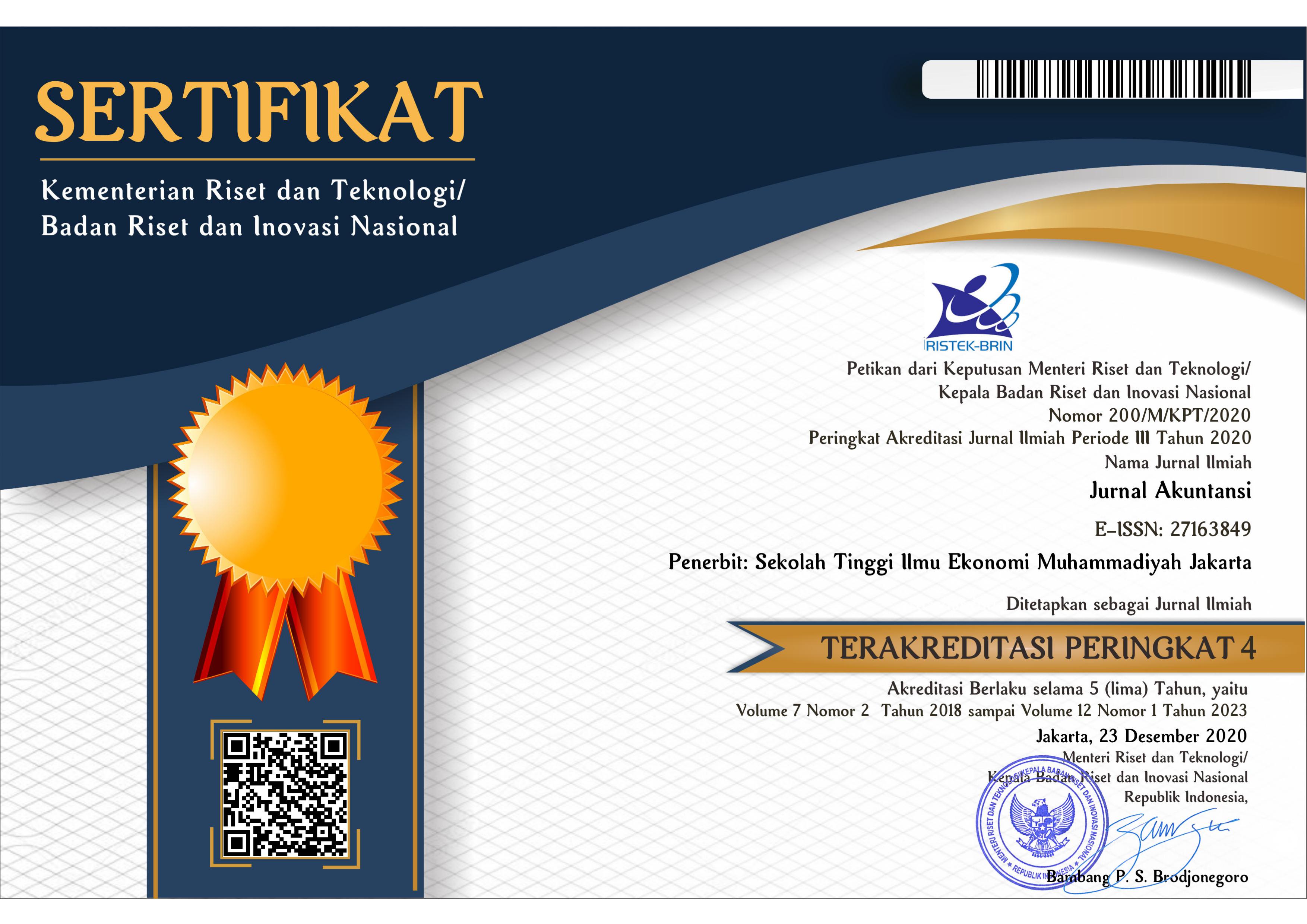PENGARUH KONEKSI POLITIK DAN STRUKTUR KEPEMILIKAN MANAJERIAL TERHADAP NILAI PERUSAHAAN
DOI:
https://doi.org/10.37932/ja.v8i1.59Keywords:
Political Connections, Managerial Ownership, Corporate ValuesAbstract
This study raises the issue of the influence of political connections and managerial ownership structures on firm value based on the phenomenon of political connection practices that occur in manufacturing companies in Indonesia. This study aims to analyze and obtain empirical evidence of the influence of political connections and managerial ownership structures on the value of the company where the long-term goals of the formation of companies to maximize the value of the company by increasing the prosperity of the owner or shareholders. This research sample uses secondary data derived from the financial statements of manufacturing companies listed on the Indonesia Stock Exchange in 2012-2016. Samples were taken using purposive sampling and that met the sample selection criteria. The sample used was 87 companies. Data is processed with Eviews 9 software using the General Least Square (GLS) method. The results of the study show that political connections have a positive positive effect on company value. While the managerial ownership structure does not have a significant effect on firm value.References
Barclay, Michael and Clifford Holderness, 1990, Negotiated block trades and corporate control, Working paper (University of Rochester, Rochester, NY).
Bliss, M. A., Gul, F. A., & Majid, A. (2011). Do Political Connections Affect The Role of Independent Audit Committees and CEO Duality? Some Evidence from Malaysian Audit Pricing.Journal of Contemporary Accounting & Economics, 7(2), 82-98.
Bushman, R. M., & Piotroski, J. D. (2006). Financial reporting incentives for conservative accounting: The influence of legal and political institutions. Journal of Accounting and Economics, 42(1-2), 107-148.
Cheung, K., Lee, F., & Ip, R. (2003). Enhancing e‐government in developing countries: managing knowledge through virtual communities. The Electronic Journal of Information Systems in Developing Countries, 14(1), 1-20.
Chaney, P.K., Faccio, M., Parsley, D.C., 2008. The quality of accounting information in politically connected firms. Unpublished working paper. Vanderbilt University.
Chaney, P.K., Faccio, M., and Parsley, D. (2010). The Quality of Accounting Information In Politically Connected Firms. AFA 2010 Atlanta Meetings Paper. Available at http://papers. ssrn.com. Diakses 10 May 2015.
Fan, J.P.H., Wong, T.J., Zhang, T., 2007. Politically connected CEOs, corporate governance and Post-IPO performance of China’s newly partially privatized firms. Journal of Financial Economics 84, 330-357.
Fisman, R. (2001). Estimating the value of political connections. American economic review, 91(4), 1095-1102.
Haruman, T. (2008). Pengaruh Struktur Kepemilikan Terhadap Keputusan Keuangan dan Nilai Perusahaan Survey pada Perusahaan Manufaktur di PT. Bursa Efek Indonesia.
Herawati, Vinola. (2008). Peran Praktek Corporate Governance sebagai Moderating Variabel dari Pengukuran Earnings Management terhadap Nilai Perusahaan. SNA XI, Pontianak
Islahudin, R. N. (2008).
Pengaruh Corporate Social Responsibility Terhadap Nilai Perusahaan Dengan Prosentase Kepemilikan Manajemen Sebagai Variabel Moderating: Studi Empiris Pada Perusahann Yang Terdaftar di Bursa Efek Jakarta. Simposium Nasional Akuntansi XI.
Jensen, M. C., &Meckling, W. H. (1976). Theory of the Firm: Managerial Behavior, Agency Costs and Ownership Structure. Journal of Financial Economics, 3(4), 305-360.
La Porta, R., Lopez-De-Silanes, F., and Shleifer, A. (1999). Corporate Ownership Around the World. The Journal of Finance, LIV(2), 471- 516. Literature, 25(1), 121-132.
Lev, B. (2003). Corporate Earnings: Facts and Fiction.Journal of Economic Perspectives, 17(2), 27-50.
Pertiwi, T. K., & Pratama, F. M. I. (2012). Pengaruh Kinerja Keuangan Good Corporate Governance Terhadap Nilai Perusahaan Food and Beverage. Jurnal Manajemen dan Kewirausahaan, 14(2), 118-127.
Purba, J. H. V. (2004). Pengaruh Proporsi Saham Publik terhadap Kinerja Perusahaan. Jurnal Ilmiah Ranggagading, 4(2), 109-116.
Rahmani, N. (2008). Analisis Efisiensi pada BUMN Privatisasi di Indonesia dengan Pendekatan Fungsi Produksi Cobb-Douglas(Master's thesis).
Rejeki, Sri. 2007. “Analisis Pengaruh Struktur Kepemilikan, Ukuran Perusahaan dan Rasio Perputaran Persediaan Terhadap Pemilihan Metode Persediaan pada Perusahaan Manufaktur Go Public di BEJ”. Skripsi Tidak Dipublikasikan, Fakultas Ekonomi, Universitas Semarang.
Sofyaningsih, S., & Hardiningsih, P. (2011). Struktur kepemilikan, kebijakan dividen, kebijakan utang dan nilai perusahaan.
Dinamika keuangan dan perbankan, 3(1).
Sujoko, dan Ugy Soebiantoro. 2007. Pengaruh Struktur Kepemilikan Saham, Leverage, Faktor intern dan Faktor Ekstern terhadap Nilai Perusahaan. Dalam Jurnal Manajemen dan Kewirausahaan, 9 (1): h. 41-48.
Wahyudi, U., & Pawestri, H. P. (2006). Implikasi struktur kepemilikan terhadap nilai perusahaan: dengan keputusan keuangan sebagai variabel intervening. Simposium Nasional Akuntansi, 9, 1-25.
Wiagustini, N. L. P., & Pertamawati, N. P. (2015). Pengaruh risiko bisnis dan ukuran perusahaan terhadap struktur modal dan nilai perusahaan pada perusahaan farmasi di bursa efek Indonesia. Jurnal Manajemen, 9(2), 1-1.
Networked: The Influence of Social Networking Sites on Political Attitudes and Behavior. Social Science Computer Review, 28(1), 75-92.
Jackowicz, Krzysztof & Kozłowski, Łukasz & Mielcarz, Paweł, 2014. "Political connections and operational performance of non-financial firms: New evidence from Poland," Emerging Markets Review, Elsevier, vol. 20(C), pages 109-135
Wati, L. N., Rachmat Sudarsono, S. E., Si, M., & Erie Febrian, S. E. (2016). Corporate Governance On Conglomerates Pollitically Connected. International Journal of Business, Economics and Law, 10(1), 23-31.
Wati, L.N., Rachmat Sudarsono, S.E., Si, M. and Erie Febrian, S.E. 2016a. Corporate governance on conglomerates politically connected. International Journal of Business, Economics and Law, 10(1), pp.23-31.
Wati, L. N. 2017. Board of commissioner’s effectiveness on politically connected conglomerates: Evidence from Indonesia. Pertanika Journal Social Sciences & Humanities, 25(S), pp. 255-270.
Downloads
Published
Issue
Section
License
License Terms




